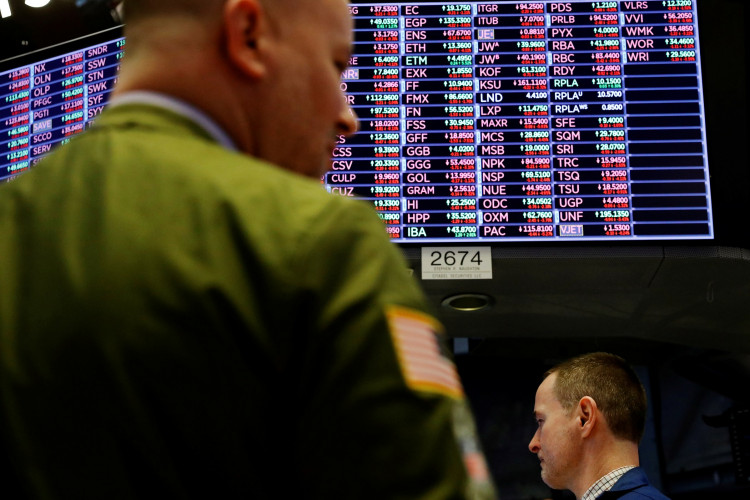U.S. stock indices fell collectively on Tuesday, with regional banks and oil stocks leading the decline. Investor concerns about the banking crisis, unease over the U.S. debt ceiling, and uncertainty about the Federal Reserve's future interest rate policy stance weighed on market risk appetite.
The takeover of First Republic Bank failed to quell market worries, causing U.S. regional bank stocks to face further sell-offs. Meanwhile, the Federal Reserve's interest rate decision looms, prompting investors to choose safety.
The Federal Reserve is expected to raise interest rates by 25 basis points early Thursday Beijing time, while carefully considering whether the current pace of the fastest rate hike cycle in 40 years should be paused.
Quincy Krosby, Chief Global Strategist at LPL Financial, said markets are concerned about the banking crisis spreading, and further rate hikes by the Federal Reserve could ignite more problems.
In addition to the pressure caused by bank failures, investors are also paying attention to the U.S. debt ceiling issue. Treasury Secretary Janet Yellen previously warned that if Congress does not raise the debt ceiling, the U.S. government may be unable to pay all its bills on time as early as June 1.
Goldman Sachs partner John Flood said in a report that bearish hedge fund traders participated in Tuesday's sell-off, which later prompted long investors to sell as well.
Ed Moya, Senior Market Analyst at Oanda, noted: "Wall Street is rapidly hitting the sell button, as the banking turmoil seems unlikely to disappear quickly, the likelihood of an economic recession is rising, and the risk of a U.S. debt default next month is increasing."
By the close, the Dow Jones fell 367.17 points, or 1.08%, to 33,684.53; the Nasdaq fell 132.09 points, or 1.08%, to 12,080.51; and the S&P 500 index fell 48.29 points, or 1.16%, to 4,119.58.
Nearly all 11 S&P 500 sectors fell, with only the Consumer Discretionary sector up 0.16%. The Energy sector plunged 4.28%, the Financial sector fell 2.3%, the Communication Services sector fell 1.78%, the Real Estate sector fell 1.73%, the Utilities sector fell 1.23%, and the Industrials sector fell 1.05%.
U.S. industry ETFs fell almost across the board, with only the Consumer Discretionary ETF up 0.10%. The Regional Bank ETF plummeted 6.32%, followed by the Banking ETF down 5.19%, the Energy ETF down 4.30%, the Financials ETF down 2.30%, the Internet Index ETF down 1.97%, the Biotech Index down 1.32%, and the Utilities ETF down 1.22%.
In popular stock performance, most tech stocks fell, with Nvidia down more than 2%, Google down more than 1%, Microsoft down 0.05%, Tesla down 0.94%, and Meta down 1.62%.
The KBW Regional Banking Index fell 5.5% to a new low since November 2020, with Alliance Western Bank down 15%, West Pacific Union Bank down nearly 28%, United Credit Bank down more than 12%, and Zions Bancorp down more than 10%.
In the oil sector, BP fell more than 8%, Chevron fell more than 4%, and Petrobras and Total fell more than 3%.
U.S. online education company Chegg said ChatGPT is damaging its business growth, causing the company's stock price to halve in Tuesday's trading.
Prominent U.S. short-seller Hindenburg Research released a report claiming that billionaire Carl Icahn's company valuation was significantly overestimated. On the day, Icahn Enterprises' stock price fell nearly 20%, retreating to its lowest level in three years.
Popular Chinese concept stocks declined, with the Nasdaq Golden Dragon China Index down 3.6%, Meituan down more than 26%, Bilibili down more than 7%, iQiyi and Pinduoduo down more than 6%, NIO down more than 4%, and Baidu, JD.com, and Alibaba down more than 3%.
Company News:
[Morgan Stanley plans to cut 3,000 jobs]
According to media sources citing insiders, Morgan Stanley executives are discussing a plan to cut about 3,000 jobs from the global workforce by the end of this quarter. This amounts to approximately 5% of the company's wealth management division employees (excluding financial advisors and middle and back-office departments). One insider said the layoffs would impact the investment banking and trading departments more heavily.
[Microsoft plans to launch a ChatGPT version running on dedicated cloud servers at ten times the price of the regular version]
Two insiders revealed that later this quarter, Microsoft's Azure cloud server division plans to sell a ChatGPT version running on dedicated cloud servers, with data stored separately from other customers. Insiders said this move is intended to reassure customers that their secrets will not leak into ChatGPT's main system. However, the cost of this product may be as much as ten times the current regular version of ChatGPT.
[AMD Q1 revenue $5.4 billion, Q1 adjusted earnings per share $0.60]
AMD reported Q1 revenue of $5.4 billion, beating estimates of $5.31 billion; Q1 adjusted operating income of $1.1 billion, surpassing estimates of $1.06 billion; and Q1 adjusted earnings per share of $0.60, outperforming estimates of $0.57. AMD expects Q2 revenue of $5.0 billion to $5.6 billion, compared to estimates of $5.51 billion; and an adjusted gross margin of approximately 50%, compared to estimates of 50.4%.
[Saudi Aramco reportedly in talks with Sinopec, Total for $10 billion natural gas deal]
Insiders disclosed that Sinopec and French energy giant Total are in talks to invest in Saudi Arabia's Jafurah natural gas field development project, as the country seeks to develop one of the world's largest untapped gas fields. Some insiders said the two energy giants are in separate discussions with Saudi Aramco about plans that may include building facilities for exporting liquefied natural gas. As the matter is not public, insiders requested anonymity. Saudi Aramco is said to be seeking to raise about $10 billion for these projects. Insiders noted that negotiations are ongoing and no final decision has been made.




